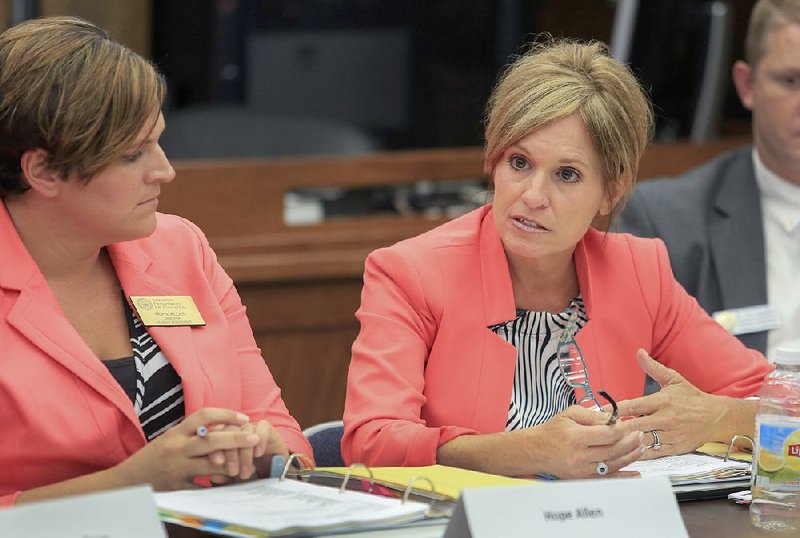The state's Charter Authorizing Panel on Wednesday gave preliminary approval to plans for two school district-sponsored conversion charter schools, including one in Fayetteville that would feature online instruction plus field trips and experiences tailored to student interests.
The plan for the Fayetteville Virtual Academy, which was praised by panel members as "a game changer for education" and "a model for the future," is on track to join a growing number of virtual schools that are becoming available at no cost to Arkansas students in kindergarten through 12th grades and their families.
The panel also unanimously approved the Cave City School District's plan to make its 400-student high school a career and college preparatory charter school that will, in part, ease the way for students to get technical-skills training and otherwise prepare them for college and careers during the regular school day.
Panel members denied a request by Quest Middle School of Pine Bluff -- a 98-pupil charter school that opened in the 2013-14 school year -- to begin offering elementary school grades. Instead, Debbie Jones, the state Department of Education's assistant commissioner for learning services and a charter panel member, called for the panel to hold a hearing as soon as next month to determine whether the school should be put on probation for low student achievement.
The panel's decisions on granting charters and charter amendments are subject to review and a vote of the Arkansas Board of Education to be finalized. The Education Board can accept the decisions of the panel -- which is made up of top Education Department staff members -- or hold its own hearings on the applications.
If given final state approval, the Fayetteville Virtual Academy for students who need an accelerated, more flexible learning program or a less stressful learning environment would begin in August.
Up to 100 pupils in grades four through eight would be served the first year. Additional grades would be added in the three subsequent years so that as many as 500 kindergarten-through-12th-graders will be served in the 2019-20 school year.
A personalized learning plan would be developed for each participating student -- including students who reside elsewhere in Arkansas but could use Arkansas School Choice Act provisions to enroll in the district and virtual school. Student visits to museums, industries and other sites would be based on their interests in arts, sciences, languages, math and technology.
Kim Garrett, associate superintendent of secondary education in the Fayetteville School District, told the panel that the school also will feature personal interaction between students and teachers.
"We have the ability for the student and parent to be able to come at least one day a week to work face to face with a teacher," Garrett said, adding that teachers in the virtual school will have regular office hours for those visits.
Math, in particular, is recognized in national research as difficult to teach and learn online. The Fayetteville school's structure is such that a student who is struggling in an online course can be pulled into small-group or one-to-one instruction, or be put into a more traditional math class, be it a special education or resource math course, or a double-block of algebra instruction.
Garrett said the use of technology and the ability to determine if students are logging into their lessons likely will make it easier for teachers to monitor student progress.
"We have learned through our investigations that many students who seek out education in a virtual environment will do so because of lack of success in a traditional school," she said.
"A lot of times, that means they will come to us with gaps in learning. We have a comprehensive list of assessments so that we can understand where the gaps are, and we have additional supports we can use to fill in those gaps. We have a host of interventions we can tailor to the specific student's needs."
School planners anticipate contracting with curriculum vendors Fuel Ed for the middle and high school grades and with K12 Inc. for the elementary grades.
The core academic subjects and popular electives will be taught by Fayetteville School District employees, while some electives may be taught by state-licensed teachers who are not necessarily Fayetteville teachers, Garrett said.
The Fayetteville district will lend computers to families that need that assistance, and the district has received a grant that can be used to help families who qualify with the cost of Internet service.
Deborah Coffman, the Education Department's chief of staff and the panel chairman, called the Fayetteville plan brilliant and a game changer for education. She urged Fayetteville district leaders to seek feedback and support from their colleagues around the state.
"We're cheering for you," said Jones, the assistant commissioner. She praised the school plan for its human components, as well as its structured assessments and interventions.
Cave City High
Cave City High School Principal Marc Walling told the Charter Authorizing Panel that planning for a charter high school was prompted by the realization that about 60 percent of Cave City High graduates start college -- thanks to supportive partnerships with Ozarka College and the University of Arkansas Community College at Batesville. But most students don't complete a degree, at least not in four years in which there is scholarship money available.
"In the class of 2011, only 8 percent of those kids graduated on time with a four-year degree," Walling said. "We found that number unacceptable. It is just too low. We asked what we could do and how we could manage that situation.
"Twenty-five percent of that class had gone into the workforce and the military, and 15 percent we felt weren't gainfully employed. We felt like we underserved those students. We felt like the college and technical students have been underserved. That's why the charter application."
The plans for the charter school call for personalized education plans and goals for students, said Cheryl Bell, a teacher and intervention specialist in the district.
Another component will be technical certification programs that will prepare students to be welders, electricians, licensed practical nurses and nurses aides, early childhood aides or emergency medical technicians. Those are skills that could lead to jobs after high school graduation and help support students who want to go on to college.
The charter plan, with its waivers of state requirements for clock hours for instruction, will enable students to acquire that training during the regular school day either at the Cave City campus or on college campuses that are 30 or more minutes away, Bell said. Otherwise, the training would take place before and after school, forcing students to choose between those courses and after-school activities such as sports, she said.
Deputy Commissioner Mark Gotcher said in voting for the proposal that the Cave City applicants demonstrated strong community partnerships.
Jennifer Liwo, a department attorney and a panel member, said the plan is innovative and includes hands-on experience through job shadowing and internships.
Jones said the school planners provided great detail and supportive data and developed multiple options for students that will allow the creation of personal learning plans.
Quest Middle School of Pine Bluff
Curtis Shack, the Arkansas program manager for Responsive Education Solutions, a Texas-based charter-school operator, and Arnold Robinson, the Quest Middle School of Pine Bluff principal, asked the authorizing panel to allow the school to add elementary grades to the existing fifth- through ninth-grade school.
Robinson said pupils on average are going to the charter school 2.5 grade levels below where they should be, and it is difficult to help those students catch up in a short time.
Two pupils at the school told the panel how much they appreciated the school that allowed them to escape bullying they endured at their previous, more traditional schools.
But panel members denied the request to expand the school after asking for evidence of success or achievement and noting that the 2013-14 state test results showed that the pupils at the school had scored significantly lower on average than middle school pupils in surrounding school systems.
School leaders told the panel that they did not have any more recent test data to present, although preliminary data from last year's Partnership for Assessment of Readiness for College and Careers is now available to schools.
Alan Wimberley, chief education architect for Responsive Education Solutions, told the panel, "We have to do something different in Pine Bluff" and that the school will be back before the panel with additional data.
"If I were sitting where you are, I'd say no, too," Wimberley said. "We'll come back. We're doing great things with 22,000 kids," he said of the organization's charter schools, "but not in Pine Bluff."
Metro on 11/19/2015

